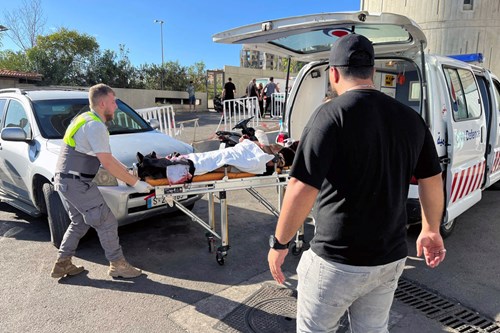Hezbollah had recently adopted the older technology as a more secure form of internal communication, according to The Daily Mail.
The supply chain for the Hezbollah pagers ran from Taiwan to Hungary, according to Reuters.
Israel’s Mossad has a long history of pulling off sophisticated attacks on foreign soil, the news agency noted.
 But what the vaunted spy agency has done now changes the face of warfare, David Grantham, a fellow with the Center For a Secure Free Society, said on American Family Radio Wednesday.
But what the vaunted spy agency has done now changes the face of warfare, David Grantham, a fellow with the Center For a Secure Free Society, said on American Family Radio Wednesday.
Reuters cited a senior Lebanese security source in saying Hezbollah believes Israel intercepted the shipment of pagers and planted explosives inside the pagers months before Tuesday’s detonations.
Grantham agrees.
Sources told Reuters that Hezbollah began to suspect that Israel was tracking their cell phones at the end of last year.
The handheld enemy within
Sec. Gen. Hassan Nasrallah delivered an impassioned speech urging supporters to ditch their cell phones in February, The Daily Mail reported.
“Shut it off, bury it, put it in an iron chest and lock it up,” Nasrallah told supporters. “Do it for the sake of security and to protect the blood and dignity of people. The collaborator (with the Israelis) is the cell phone in your hands, and those of your wife and your children. This cell phone is the collaborator and the killer.”
 Even in technology, age has its advantages, Grantham told show host Jenna Ellis.
Even in technology, age has its advantages, Grantham told show host Jenna Ellis.
“Although they're antiquated, the beauty of sometimes being antiquated is that modern technology can't locate you as well as other things,” Grantham he said.
Pagers made Hezbollah communication slower but gave the terrorists confidence that they were safe – or so they believed.
“When you go into secure areas where you cannot have a cell phone that transmits two ways, a pager allows you to go into a place, be told you have a call, and then you can leave that place and go take that call."
 Pager use remains active in the U.S. more than many people may realize, according to PagersDirect.com.
Pager use remains active in the U.S. more than many people may realize, according to PagersDirect.com.
The security rate is high unless you’re an enemy of the State of Israel.
“The operation here was intending for them to think they had a call that they needed to go make. So, they pick up their pager, look at it, and while they're looking at it, it explodes,” Grantham explained.
The fact that batteries by themselves do not explode supports the theory of supply chain disruption by someone, Grantham said.

“The actual technique is all speculation at this point. The differentiator, when I'm looking at the evidence, is the battery. Batteries don't explode, as far as we can tell. Batteries usually catch fire. They heat up, catch fire. That detail alone has directed a lot of different people to suspect that Israel somehow was able to intervene in the supply chain before the pagers got to Hezbollah.”
Supply chain disruption is not a revolutionary tactic, Grantham said. It’s been around a long time. Many other nations have done it, including the U.S.
“What is new is the technique to supposedly, as best we can tell, put explosive material inside each pager and know that each pager is going to the proper destination and then being able to control the explosion from a remote location,” Grantham said.
“Those things are absolutely fascinating. Israel has changed the course of warfare in terms of supply chain management for electronics. I mean, the standards for how Hezbollah will operate, how everyone else in the world is going to operate, is going to change from here on out.”
Reaction in the U.S.
The death toll from Tuesday reached 12 including two children, Lebanese Health Minister Firass Abiad said Wednesday.
U.S. House Rep. Rashida Tlaib called social media response to the attack – which created streams of memes -- “disgusting” in her one-word post on X Wednesday afternoon.
If the death of two children is accurate, that’s 10 children fewer than died when Hezbollah rockets struck a soccer field filled with Israeli youths July 27.
 Social media reaction was immediate.
Social media reaction was immediate.
Hezbollah was wobbly and confused a day later, but Israel wasn't finished.
Hand-held radios and solar equipment exploded in Beirut and multiple parts of Lebanon on Wednesday in an apparent second wave of attacks, The Associated Press and others reported.
At least nine people were killed and 300 wounded in the fresh round of attacks, the Lebanon Health Ministry said.
Speaking to Israeli troops on Wednesday, Israeli Defense Minister Yoav Gallant said, “We are at the start of a new phase in the war — it requires courage, determination and perseverance, The AP reported. Gallant made no mention of the explosions of electronic devices but praised the work of Israel’s army and security agencies, saying “the results are very impressive.”
There's been no immediate response to the latest attacks from the U.S. or Iran as the "new phase" could lead other world powers into the conflict.
Among the latest attacks, several blasts were heard at a funeral in Beirut for three Hezbollah members and a child killed by exploding pagers the day before, The AP reported.
Earlier Wednesday Iranian President Masoud Pezeshkian accused the U.S. and its allies of being behind the first exploding pagers attack, and U.S. Sec. of State Antony Blinken expressed concern that the attack could derail ceasefire negotiations, The AP reported.
Israelis break new ground in cyberwarfare
What has Grantham’s attention is the anticipated response of world governments, responses that won’t make it to social media or official statements.
Cyberwarfare creates mental images of locked computers and compromised data.
The Israelis had already covered new cyber ground with Stuxnet, their computer worm that was used to attack Iranian nuclear facilities in 2010. It caused physical damage to industrial equipment rather than simply stealing data or spying.
The pager attack takes things to a new level.
“If explosives were inserted, that's not necessarily a cyber incident. It's a combination of cyber and physical manipulation. Nevertheless, what it says not only can your electronics be surveilled and we can listen to what you're saying, we could use your electronics to kill you,” Grantham said.
“That shift in mindset is going to cause everyone across the world, adversaries and allies," he continued, "to begin addressing how they use their technology because if it can become a threat to your life, that's much different than data manipulation and surveillance.”







